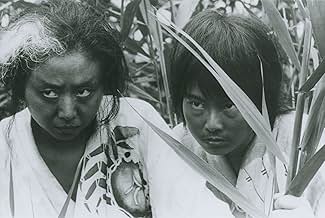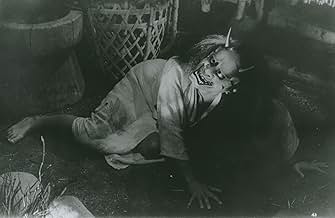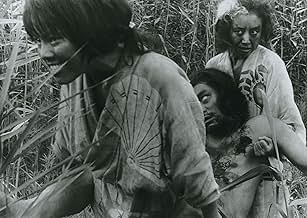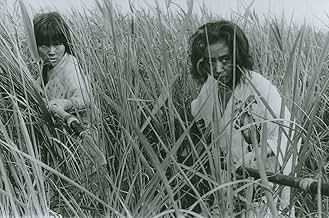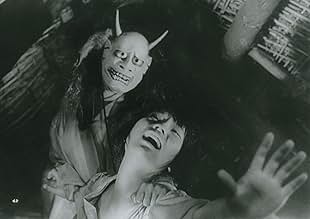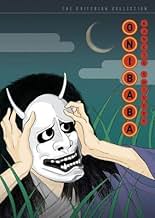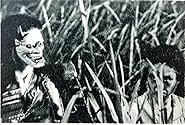CALIFICACIÓN DE IMDb
7.9/10
24 k
TU CALIFICACIÓN
Dos mujeres matan samuráis y venden sus pertenencias para ganarse la vida. Mientras una tiene una aventura con su vecino, la otra mujer conoce a un misterioso samurái que lleva una máscara e... Leer todoDos mujeres matan samuráis y venden sus pertenencias para ganarse la vida. Mientras una tiene una aventura con su vecino, la otra mujer conoce a un misterioso samurái que lleva una máscara extraña.Dos mujeres matan samuráis y venden sus pertenencias para ganarse la vida. Mientras una tiene una aventura con su vecino, la otra mujer conoce a un misterioso samurái que lleva una máscara extraña.
- Dirección
- Guionista
- Elenco
- Premios
- 2 premios ganados en total
- Dirección
- Guionista
- Todo el elenco y el equipo
- Producción, taquilla y más en IMDbPro
Opiniones destacadas
Onibaba is a supernatural horror film based on a Buddhist fable. It's about a couple of women in feudal Japan surviving the hardships of war by murdering and robbing stray samurais who wander unwittingly into their path. Their domain is a huge field of tall reeds with an ominous deep hole at its centre where they dispose of the unfortunate men they kill. Things are complicated when a male neighbour returns from the war and unleashes sexual tensions within the women which ends in horror. And that is to say nothing of the demon mask...
Onibaba is an artistically strong piece of cinema. From the outset the film is aurally intense, with repetitive beating drums announcing the beginning of the tale. The widescreen frame is consistently used brilliantly, with beautifully lit black and white photography. From the constantly swaying reeds to the close-ups of the protagonist's faces, the visuals capture the mysterious yet ominous beauty of the natural world, while emphasising the intense emotions of the protagonists. The setting ensures that the atmosphere is one of claustrophobia. In fact one of the themes of Onibaba is the way that the natural landscape can shape the way we are. The field of reeds allows the women to get close enough to kill warriors; it is one of the things that shapes them into killers, as it allows them to murder at will undetected. Similarly, the film is an allegory on capitalism. The war has forced these starving women to find their own way to survive the hardships all around them. They take extreme measures to feed the capitalist machine, as they murder and sell on that which they steal to a local low-life. Capitalism has dehumanised them and the black hole in the centre swallows up the victims. But aside from this, it is an intense human drama intertwined with eerie supernatural horror. The scenes near the end of the film with the demon in the reeds are beautifully creepy. While the horrific curse of the mask results in some scary and disorientating final scenes. In addition, there is a powerful depiction of female sexuality. These women are no shrinking violets. They are aggressive, amoral and deadly.
Onibaba is a film that is sumptuous both visually and aurally; yet its characters and story are devoid of beauty. It's one of the best examples of a horror art film.
Onibaba is an artistically strong piece of cinema. From the outset the film is aurally intense, with repetitive beating drums announcing the beginning of the tale. The widescreen frame is consistently used brilliantly, with beautifully lit black and white photography. From the constantly swaying reeds to the close-ups of the protagonist's faces, the visuals capture the mysterious yet ominous beauty of the natural world, while emphasising the intense emotions of the protagonists. The setting ensures that the atmosphere is one of claustrophobia. In fact one of the themes of Onibaba is the way that the natural landscape can shape the way we are. The field of reeds allows the women to get close enough to kill warriors; it is one of the things that shapes them into killers, as it allows them to murder at will undetected. Similarly, the film is an allegory on capitalism. The war has forced these starving women to find their own way to survive the hardships all around them. They take extreme measures to feed the capitalist machine, as they murder and sell on that which they steal to a local low-life. Capitalism has dehumanised them and the black hole in the centre swallows up the victims. But aside from this, it is an intense human drama intertwined with eerie supernatural horror. The scenes near the end of the film with the demon in the reeds are beautifully creepy. While the horrific curse of the mask results in some scary and disorientating final scenes. In addition, there is a powerful depiction of female sexuality. These women are no shrinking violets. They are aggressive, amoral and deadly.
Onibaba is a film that is sumptuous both visually and aurally; yet its characters and story are devoid of beauty. It's one of the best examples of a horror art film.
Life's been tough, and you're surviving on the edge, trapping Samurai from flows in which you dredge, your often empty skillet, is sometimes, filled with millet, but at least your daughter in law helps you fetch. A neighbour returns home, with some bad news, your son, fallen in battle, no longer moves, it's not long before his wife, is causing stress, struggle and strife, behaving in a way you wholly disapprove. By fortune, you obtain a Hannya Mask, it comes in handy for a demonising task, a barrier of sorts, daughter in law's trips cut short, but there's no time to enjoy pleasures, or to bask.
Nobuko Otowa provides us with a truly outstanding performance as she grapples with her daughter in law's infidelity after the loss of her husband, leaving her isolated, alone and forgotten. The cinematography is sublime, the raw emotions unrefined, and the mask a cursed damnation that sticks and binds.
Nobuko Otowa provides us with a truly outstanding performance as she grapples with her daughter in law's infidelity after the loss of her husband, leaving her isolated, alone and forgotten. The cinematography is sublime, the raw emotions unrefined, and the mask a cursed damnation that sticks and binds.
In the 1400s raging wars between two emperors is being fought. This is not about the wars, but about the poor people struck by it. In a rural location camouflaged by a huge field of tall reeds are two huts. In one of them a young woman lives with her stepmother, her husband went to war. Having had failed crops three times that year they are stricken by poverty. The only way for them to survive is to steal, and the only things to steal are uniforms and swords from dead soldiers or heavily wounded soldiers and then sell them to the underworld. Which by the way is funny, I never thought of the underworld in rural medieval setting before.
This story is just as grim as the demon on the cover. The wind howling in the reeds make for very creepy atmosphere. The music consisting of drums and brassy wind instruments really intensifies the drama.
Just as in sand in Teshigaharas equally excellent 'Suna no Onna' serves as symbol, metaphor and is very important in creating atmosphere we have in 'Onibaba' the tall reeds.
The theme in this, the basic needs and emotions of people, will never be dated. The psychology is thick and real. They are victims of their leaders actions. With all the wars being fought today this is still happening today, please remember that.
This story is just as grim as the demon on the cover. The wind howling in the reeds make for very creepy atmosphere. The music consisting of drums and brassy wind instruments really intensifies the drama.
Just as in sand in Teshigaharas equally excellent 'Suna no Onna' serves as symbol, metaphor and is very important in creating atmosphere we have in 'Onibaba' the tall reeds.
The theme in this, the basic needs and emotions of people, will never be dated. The psychology is thick and real. They are victims of their leaders actions. With all the wars being fought today this is still happening today, please remember that.
Onibaba is a very well done film, purposefully using black and white cinema to its' advantage in this stunning portrayal of murder, jealousy, and uncontrollable human instinct in a dark period of Japan's history.
A film that aims at portraying the baser side of human nature and investigating human psychology, it is chalk-full of symbolic scenes and sequences. From start to finish it draws you in with the odd imagery and scenery of Japan's rural areas, and even though in this film though there are very few characters and elements that are to it, both visually and literally, through its' minimalism it effectively tells its' story.
This film is both very artistic & symbolic as well as literal and upfront, juxtaposing very graphic, real images of the face of humanity that demand the viewer to infer much throughout the whole of the film. When going into this film, I would say that it is very important for the viewer to think of the film as being very symbolic for the instincts and base nature of mankind, and perhaps even a 'state of nature' portrayal of humanity. If you watch this film with that in mind, it will help with the inferences that one must make to get the most out of this film.
As it stands by itself, aside from the deeper meaning, it is an intriguing story that is a veritable 'slice of life' film in the darker sense, viewing the way that people had to live during a period of war and hard times in feudal Japan. It deals with the hardships that these people face, and their method of survival, in addition to a very human story of jealousy and portrayal with a very interesting culminating point that I did not expect at all. The climax of the film is very much worth the build-up, though at times it seemed to be rather slow.
Overall, a very important piece of film when it comes to the symbolism and techniques employed. Through its' minimalism and black-and-white cinematography we are really treated to a great film that is, of its' own right, an influential and great movie. The cinematography is exceptionally good, especially the use of the reeds and the light at night.
I would recommend this film to anybody with a serious interest in film, as well as anybody who likes a good film that investigates the darker side of human nature.
A film that aims at portraying the baser side of human nature and investigating human psychology, it is chalk-full of symbolic scenes and sequences. From start to finish it draws you in with the odd imagery and scenery of Japan's rural areas, and even though in this film though there are very few characters and elements that are to it, both visually and literally, through its' minimalism it effectively tells its' story.
This film is both very artistic & symbolic as well as literal and upfront, juxtaposing very graphic, real images of the face of humanity that demand the viewer to infer much throughout the whole of the film. When going into this film, I would say that it is very important for the viewer to think of the film as being very symbolic for the instincts and base nature of mankind, and perhaps even a 'state of nature' portrayal of humanity. If you watch this film with that in mind, it will help with the inferences that one must make to get the most out of this film.
As it stands by itself, aside from the deeper meaning, it is an intriguing story that is a veritable 'slice of life' film in the darker sense, viewing the way that people had to live during a period of war and hard times in feudal Japan. It deals with the hardships that these people face, and their method of survival, in addition to a very human story of jealousy and portrayal with a very interesting culminating point that I did not expect at all. The climax of the film is very much worth the build-up, though at times it seemed to be rather slow.
Overall, a very important piece of film when it comes to the symbolism and techniques employed. Through its' minimalism and black-and-white cinematography we are really treated to a great film that is, of its' own right, an influential and great movie. The cinematography is exceptionally good, especially the use of the reeds and the light at night.
I would recommend this film to anybody with a serious interest in film, as well as anybody who likes a good film that investigates the darker side of human nature.
Set during a very dark time of war,where weapons and food are the items of barter due to their scarceness, which sees two different Emperors on the throne of Japan and Kyoto destroyed by fire
.our story is that of a Mother and her Daughterin-law who have been left on their own to fend for themselves while the son/husband of our main protagonists is away at war
.The Mother and daughter duo take care of themselves by killing any stray Samurai/warrior that passes their way and stripping them of their armour and weapons which they then trade for millet from the unscrupulous Ushi. One night Hachi a neighbour who had been at war with the missing Husband/son arrives at their hut in a very bedraggled state and tells them of his untimely death.The women are distraught
..Hachi has made his intentions clear he wants the daughter-in-Law as his woman
The Mother afraid of being left alone warns the daughter off
.The ensuing drama is a tale of their sexual tension in the high summer heat, which is exemplified by the swaying of the reeds/grass, the faster the reeds blow in the wind the higher the sexual tension .The mother plays on the fears of the daughter by telling her tales of Demons who prey on those who do wrong
.the wrong being sex outside of marriage, but this is just a smokescreen as the mother throws herself at Hachi and asks him to sleep with her
Hachi refuses, this is the final straw for the mother.The mother meets a Samurai General who is lost in the reeds, she kills him and takes the very scary Demon mask which he wore and wears it herself each night to scare the daughter when the daughter sneaks out for her nightly fix of lust with Hachi. This a very technically proficient film, not really a horror film until arguably the films last quarter
..it has surprisingly a lot of nudity which is not intrusive but is put there by Shindo to show that nudity is not really an issue for someone who has to kill every day just to survive. Shindo also uses Black and White to stunning effect at a time when it was probably easier to film in colour
..this is not a horror masterpiece
This is a Cinematic Masterpiece!
¿Sabías que…?
- TriviaOnibaba's literal meaning is demon hag or old devil woman.
- ErroresWhen the two soldiers get off their horses and start fighting in the river, the audio of the water splashing goes on and off. In addition, when the swords clash, there is no sound of clanging heard.
- Versiones alternativasOriginally cut in England when released in 1968, though the video releases are uncut.
Selecciones populares
Inicia sesión para calificar y agrega a la lista de videos para obtener recomendaciones personalizadas
- How long is Onibaba?Con tecnología de Alexa
Detalles
Taquilla
- Total a nivel mundial
- USD 689
- Tiempo de ejecución
- 1h 43min(103 min)
- Color
- Mezcla de sonido
- Relación de aspecto
- 2.35 : 1
Contribuir a esta página
Sugiere una edición o agrega el contenido que falta


